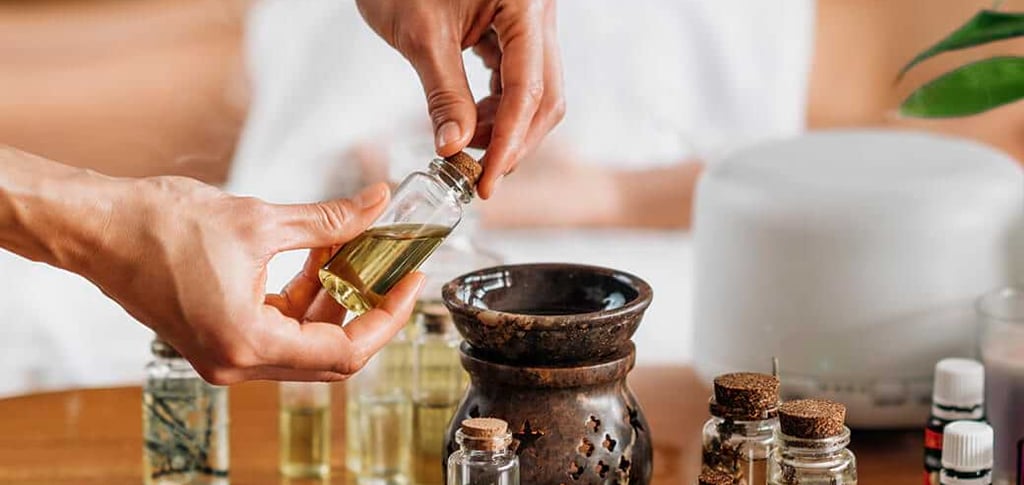Breathe in Serenity: Aromatherapy for Your Well-being
Discover the power of essential oils to enhance your physical and mental well-being. Aromatherapy offers natural solutions for stress, sleep, and more.
WELLNESSBLOG-LISTHEALTHESSENTIAL OILS
11/20/20244 min read


Aromatherapy is much more than just "nice smells." It's an ancient practice that uses the power of plants to harmonize body and mind. Imagine: a few drops of lavender essential oil to soothe your tensions, a hint of peppermint to give you a boost, or the captivating aroma of ylang-ylang to envelop you in softness... Ready to dive into the fascinating world of aromatherapy and discover its benefits for your well-being?
In short:
Aromatherapy uses essential oils extracted from plants.
It offers natural solutions to improve physical and mental well-being.
Essential oils can be used in different ways: diffusion, massage, bath...
Aromatherapy can relieve stress, anxiety, sleep disorders, and much more.
It is important to choose quality essential oils and use them with caution.
Table of Contents
What is aromatherapy?
How does aromatherapy work?
The benefits of aromatherapy
Stress and anxiety
Sleep
Concentration and memory
Muscle and joint pain
Emotional well-being
How to use essential oils?
Precautions for use
FAQ
Conclusion
1. What is aromatherapy?
Aromatherapy is a branch of herbal medicine that uses aromatic plant extracts, called essential oils, to improve physical and mental well-being. These essential oils are obtained by steam distillation or cold pressing of different parts of the plant: flowers, leaves, roots, bark... Each essential oil has a unique chemical composition that gives it specific therapeutic properties.
2. How does aromatherapy work?
Essential oils act on our body in two main ways:
Through the olfactory pathway: When you breathe in an essential oil, its aromatic molecules stimulate the olfactory receptors in your nose. These receptors send signals to the limbic system, a part of the brain involved in emotions, memory, and behavior. This is why certain smells can evoke memories, influence your mood, or even relieve stress.
Through the skin: When applied to the skin, essential oils penetrate the body and can act on different systems: circulatory, respiratory, nervous... They can thus relieve muscle pain, promote blood circulation, or even stimulate the immune system.
3. The benefits of aromatherapy
Aromatherapy offers a multitude of benefits for health and well-being. Here are a few examples:
Stress and anxiety: Lavender, Roman chamomile, and neroli are known for their calming and relaxing properties. They can help reduce stress, anxiety, and nervous tension.
Sleep: Lavender, marjoram, and petitgrain bigarade promote restful sleep. Diffuse a few drops of these essential oils in your bedroom before bed to create an atmosphere conducive to relaxation and sleep.
Concentration and memory: Rosemary, peppermint, and lemon stimulate cognitive function and improve concentration. They can be helpful in cases of mental fatigue, lack of concentration, or memory loss.
Muscle and joint pain: Lemon eucalyptus, wintergreen, and rosemary camphor have analgesic and anti-inflammatory properties. They can relieve muscle pain, aches, rheumatism, and joint pain.
Emotional well-being: Ylang-ylang, rose geranium, and Damask rose are precious essential oils to harmonize emotions and promote emotional well-being. They can help fight depression, anxiety, sadness, and lack of self-confidence.
4. How to use essential oils?
There are different ways to use essential oils:
Diffusion: Atmospheric diffusion is ideal for purifying the air, creating a pleasant olfactory atmosphere, and enjoying the benefits of essential oils on an emotional and respiratory level.
Massage: Dilute a few drops of essential oil in a vegetable oil (sweet almond, jojoba, coconut...) and massage the affected area. Aromatic massage helps relieve muscle pain, improve blood circulation, and promote relaxation.
Bath: Add a few drops of essential oil to your bath for a moment of relaxation and well-being. Essential oils disperse in hot water and release their aromas, offering you a true sensory experience.
Inhalation: Pour a few drops of essential oil on a handkerchief or in a bowl of hot water and inhale the vapors. Inhalation is particularly effective for clearing the airways in case of colds, sinusitis, or bronchitis.
5. Precautions for use
Quality of essential oils: Choose 100% pure and natural essential oils, preferably organic. Check the composition and botanical origin of the essential oil.
Dilution: Essential oils are very concentrated and can be irritating to the skin. It is important to dilute them in a vegetable oil before applying them to the skin.
Sensitivity: Some people may be sensitive to essential oils. Do a skin test before using a new essential oil.
Contraindications: Some essential oils are contraindicated for pregnant women, breastfeeding women, young children, and people with certain diseases. Seek advice from a healthcare professional before using essential oils.
6. FAQ
Q: What is the difference between an essential oil and a fragrance?
A: An essential oil is a natural plant extract, obtained by distillation or expression. A fragrance is a synthetic product, composed of artificial aromatic molecules. Essential oils have therapeutic properties, unlike fragrances.
Q: Where to buy quality essential oils?
A: You can find quality essential oils in organic stores, pharmacies, herbalists, and online. Choose brands known for their seriousness and commitment to quality.
Q: Can I use any essential oil for diffusion?
A: Yes, most essential oils can be diffused. However, some essential oils, such as peppermint, are very powerful and it is advisable to use them in moderation.
Q: How do I store my essential oils?
A: Store your essential oils in tinted glass bottles, away from light and heat.
7. Conclusion
Aromatherapy is a natural and holistic approach to taking care of yourself and improving your well-being. By using essential oils with care and following the instructions for use, you can enjoy their many benefits for your physical and mental health. Feel free to explore the fascinating world of essential oils and find the ones that suit you best.
